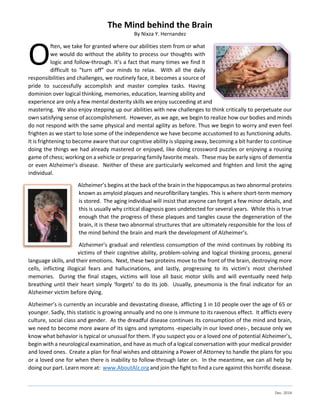Report
Share
Download to read offline

Recommended
Recommended
More Related Content
Similar to The Mind behind the Brain(12.27.2014)
Similar to The Mind behind the Brain(12.27.2014) (20)
Chapter7 Disorders of social-emotional development

Chapter7 Disorders of social-emotional development
Dementia is the most obvious—and probably most feared

Dementia is the most obvious—and probably most feared
10 Neurocognitive DisordersWildpixeliStockThinkstock.docx

10 Neurocognitive DisordersWildpixeliStockThinkstock.docx
10 Neurocognitive DisordersWildpixeliStockThinkstock.docx

10 Neurocognitive DisordersWildpixeliStockThinkstock.docx
What Is Childhood Alzheimer's: Signs, Symptoms, & Causes

What Is Childhood Alzheimer's: Signs, Symptoms, & Causes
IntroductionEvery author, I suppose, has in mind a set.docx

IntroductionEvery author, I suppose, has in mind a set.docx
The Mind behind the Brain(12.27.2014)
- 1. The Mind behind the Brain By Nixza Y. Hernandez Dec. 2014 ften, we take for granted where our abilities stem from or what we would do without the ability to process our thoughts with logic and follow-through. It’s a fact that many times we find it difficult to “turn off” our minds to relax. With all the daily responsibilities and challenges, we routinely face, it becomes a source of pride to successfully accomplish and master complex tasks. Having dominion over logical thinking, memories, education, learning ability and experience are only a few mental dexterity skills we enjoy succeeding at and mastering. We also enjoy stepping up our abilities with new challenges to think critically to perpetuate our own satisfying sense of accomplishment. However, as we age, we begin to realize how our bodies and minds do not respond with the same physical and mental agility as before. Thus we begin to worry and even feel frighten as we start to lose some of the independence we have become accustomed to as functioning adults. It is frightening to become aware that our cognitive ability is slipping away, becoming a bit harder to continue doing the things we had already mastered or enjoyed, like doing crossword puzzles or enjoying a rousing game of chess; working on a vehicle or preparing family favorite meals. These may be early signs of dementia or even Alzheimer’s disease. Neither of these are particularly welcomed and frighten and limit the aging individual. Alzheimer’s begins at the back of the brain in the hippocampus as two abnormal proteins known as amyloid plaques and neurofibrillary tangles. This is where short-term memory is stored. The aging individual will insist that anyone can forget a few minor details, and this is usually why critical diagnosis goes undetected for several years. While this is true enough that the progress of these plaques and tangles cause the degeneration of the brain, it is these two abnormal structures that are ultimately responsible for the loss of the mind behind the brain and mark the development of Alzheimer’s. Alzheimer’s gradual and relentless consumption of the mind continues by robbing its victims of their cognitive ability, problem-solving and logical thinking process, general language skills, and their emotions. Next, these two proteins move to the front of the brain, destroying more cells, inflicting illogical fears and hallucinations, and lastly, progressing to its victim’s most cherished memories. During the final stages, victims will lose all basic motor skills and will eventually need help breathing until their heart simply ‘forgets’ to do its job. Usually, pneumonia is the final indicator for an Alzheimer victim before dying. Alzheimer’s is currently an incurable and devastating disease, afflicting 1 in 10 people over the age of 65 or younger. Sadly, this statistic is growing annually and no one is immune to its ravenous effect. It afflicts every culture, social class and gender. As the dreadful disease continues its consumption of the mind and brain, we need to become more aware of its signs and symptoms -especially in our loved ones-, because only we know what behavior is typical or unusual for them. If you suspect you or a loved one of potential Alzheimer’s, begin with a neurological examination, and have as much of a logical conversation with your medical provider and loved ones. Create a plan for final wishes and obtaining a Power of Attorney to handle the plans for you or a loved one for when there is inability to follow-through later on. In the meantime, we can all help by doing our part. Learn more at: www.AboutAlz.org and join the fight to find a cure against this horrific disease. O
